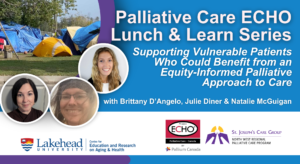
- This event has passed.
Palliative Care ECHO Lunch & Learn with Brittany D’Angelo, Julie Diner & Natalie McGuigan
May 15 @ 12:00 pm - 1:00 pm

Session Info:
Imagine trying to access home care without a home…
In this session, members of the Palliative Advocacy Care Team (PACT) & Palliative Carelink will discuss how health and social care workers can adopt approaches to care that recognize and adapt to the social and structural determinants of health. The goal of this session is to challenge providers to re-think traditional models of care, and pursue practices that meet unmet needs of structurally vulnerable populations.
Learning objectives:
- Explore what it means to take an equity-informed approach to care
- Review the concepts of harm reduction, trauma-informed care, and cultural safety
- Identify barriers to care and resources for vulnerably housed clients who could benefit from a palliative approach to care
Presenter Bios:
Brittany D’Angelo (she/her), MPH, BHSc, AEMCA
Brittany D’Angelo is the Manager of Palliative Carelink & Safer Supply at Norwest Community Health Centres. Brittany has spent time working as a frontline paramedic, a community paramedic with a palliative care scope of practice, and as a policy consultant for the Canadian Public Health Association. Brittany has developed a passion for health equity and social justice that she uses to develop new models of care aimed at increasing access for marginalized populations. When not at work, you can find Brittany enjoying the outdoors with her partner and dog.
Julie Diner, Lived Experience
Julie Diner is a palliative care Harm Reduction Support worker at Norwest Community Health Centres. Born and raised in Thunder Bay and a mother of three. Julie has been working with the city’s most vulnerable for the last 7 years at Shelter House and NorWest CHC. She is a facilitator of the St Elizabeth’s Curriculum on palliative care for front line workers for Hospice Northwest. In her spare time Julie is an active member of Thunder Bay’s recovery community and enjoys staying active.
Natalie McGuigan, RN, BMSc
Natalie is the Nurse Navigator for Palliative Carelink at Norwest Community Health Centres. Natalie has been working as a RN for over 21 years in a variety of nursing roles. Prior to starting at Norwest, she worked five years as a palliative care nurse with home care. When not at work, she likes to be outdoors or spending time with her family.